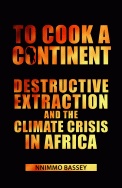Ressources
 Instead of asking the question what can be done about or for Africa, Nnimmo Bassey asks a much more pertinent question : what is being done to Africa and how should Africans respond to it ? Bassey, a human/environmental rights activist, executive Director of Environmental Rights Action (ERA) and chair of Friends of the Earth International, is well placed to answer these questions. He fluently links heaps of field experiences, from gas flare regions in Nigeria to gold mines in Mali, with a wide range of reports exposing the ways in which Africa is still exploited today. Quoting Lawrence Summers, Obama’s top economic adviser in 2009-2010, is easy : ‘I’ve always thought that under-populated countries in Africa are vastly under-polluted’. Detailing how World Bank and IMF organized the plundering and pollution while weakening democracy is harder. What is nice about this book is that Bassey does just that, full of detail and examples. What emerges is an account of the ongoing pre-mediated, organized destructive extraction of Africa. Mainly coordinated from Washington, but just as well by Canadian companies or emerging powers like China. While the Sudanese regime was waging war in Darfur, China took 10% of its crude oil needs from Sudan, no questions asked. It is also packed with examples of the damages the extraction industries leave behind, from the death of 1000 people in Nigeria, when a petrol pipeline exploded, over the slower deaths in the region around Obuasi (Ghana) to the case in Tanzania where brutal force of a Canadian firm buried 52 informal mineworkers, alive. Then he goes on to talk about the even bigger damage all this extraction of oil and gas is doing to Africa as a whole, from polluting whole river systems to climate change. One injustice is added to the next and even the ‘solution’ offered to climate change is more damaging than helpful. False solutions are created and compensation for damages remain as remote as ever. No wonder he then goes on to the issue of how to achieve justice. The tone for every chapter of his book is set by one of his activist poems.
Instead of asking the question what can be done about or for Africa, Nnimmo Bassey asks a much more pertinent question : what is being done to Africa and how should Africans respond to it ? Bassey, a human/environmental rights activist, executive Director of Environmental Rights Action (ERA) and chair of Friends of the Earth International, is well placed to answer these questions. He fluently links heaps of field experiences, from gas flare regions in Nigeria to gold mines in Mali, with a wide range of reports exposing the ways in which Africa is still exploited today. Quoting Lawrence Summers, Obama’s top economic adviser in 2009-2010, is easy : ‘I’ve always thought that under-populated countries in Africa are vastly under-polluted’. Detailing how World Bank and IMF organized the plundering and pollution while weakening democracy is harder. What is nice about this book is that Bassey does just that, full of detail and examples. What emerges is an account of the ongoing pre-mediated, organized destructive extraction of Africa. Mainly coordinated from Washington, but just as well by Canadian companies or emerging powers like China. While the Sudanese regime was waging war in Darfur, China took 10% of its crude oil needs from Sudan, no questions asked. It is also packed with examples of the damages the extraction industries leave behind, from the death of 1000 people in Nigeria, when a petrol pipeline exploded, over the slower deaths in the region around Obuasi (Ghana) to the case in Tanzania where brutal force of a Canadian firm buried 52 informal mineworkers, alive. Then he goes on to talk about the even bigger damage all this extraction of oil and gas is doing to Africa as a whole, from polluting whole river systems to climate change. One injustice is added to the next and even the ‘solution’ offered to climate change is more damaging than helpful. False solutions are created and compensation for damages remain as remote as ever. No wonder he then goes on to the issue of how to achieve justice. The tone for every chapter of his book is set by one of his activist poems.
Popping A million explosions A shower of soot On open raw nerves Oil’s not well That starts a well Now the earth is ablaze Where will the people go ?
So what hope is there for the people of Africa ? Bassey sees the spirit of Thomas Sankara lingering beneath the surface, ready for a revival. He notes the Cochabamba People’s Summit on Climate Change and the Arab spring. Those searching for a detailed roadmap out of the current web of injustices might remain a bit hungry but maybe that’s because that story probably requires more than one book. This book does, however, read as a fluently written introduction to the main problem in Africa : our unapologetic craving for resources and our unfair means to get them.
Nnimmo Bassey is part of the EJOLT network. He is one of Time magazine’s Heroes of the Environment 2009. In 2010, Bassey received the Rights Livelihood Award (alternative Nobel Prize) price “…for revealing the full ecological and human horrors of oil production and for his inspired work to strengthen the environmental movement in Nigeria and globally.” His rich knowledge on oil and gas conflicts will serve as input for our database on environmental conflicts.


